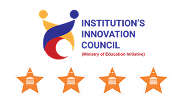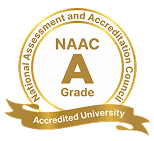Online Programmes Click here Open House -2026 Click here
Online Programmes Click here Open House -2026 Click here
ADMISSION ENQUIRY - 2026
Faculty of Engineering & Technology
BACHELOR OF TECHNOLOGY IN COMPUTER SCIENCE & ENGINEERING (ARTIFICIAL INTELLIGENCE AND MACHINE LEARNING)
Program Details
Fees
Tuition Fees
₹ 170000
Contact No.:
+91- (M) 7567020548
admission.ict@ganpatuniversity.ac.in
Eligibility
Program Outcome
1. Apply the knowledge of mathematics, science, engineering fundamentals, and an engineering specialization to the solution of complex engineering problems.
2. Identify, formulate, review research literature, and analyze complex engineering problems reaching substantiated conclusions using first principles of mathematics, natural sciences, and engineering sciences.
3. Design solutions for complex engineering problems and design system components or processes that meet the specified needs with appropriate consideration for the public health and safety, and the cultural, societal, and environmental considerations.
4. Use research-based knowledge and research methods including design of experiments, analysis and interpretation of data, and synthesis of the information to provide valid conclusions.
5. Create, select, and apply appropriate techniques, resources, and modern engineering and IT tools including prediction and modeling to complex engineering activities with an understanding of the limitations.
6. Apply reasoning informed by the contextual knowledge to assess societal, health, safety, legal and cultural issues and the consequent responsibilities relevant to the professional engineering practice.
7. Understand the impact of the professional engineering solutions in societal and environmental contexts, demonstrate the knowledge of, and need for sustainable development.
8. Apply ethical principles and commit to professional ethics, responsibilities, and norms of the engineering practice.
9. Function effectively as an individual, and as a member or leader in diverse teams, and in multidisciplinary settings.
10. Communicate effectively on complex engineering activities with the engineering community and with society, such as, being able to comprehend and write effective reports and design documentation, make effective presentations, and give and receive clear instructions.
11. Demonstrate knowledge and understanding of the engineering and management principles and apply these to one’s own work, as a member and leader in a team, to manage projects and in multidisciplinary environments.
12. Recognize the need for, and have the preparation and ability to engage in independent and life-long learning in the broadest context of technological change.
Program Educational Objectives (PEO)
1. Graduates will be able to engage in learning, understanding, design and applying new ideas and technologies as big data & analytics field evolves along with participation in creative, synthetic and integrative activities.
2. Graduates will have the ability to adapt, contribute and innovate new technologies and systems in the key domains of Computer Science and Engineering.
3. Graduates will be ethically and socially responsible solution providers and entrepreneurs in Computer Science and other engineering disciplines.
4. Graduates will possess the additional skills in handling Big Data & Analytics using the state-of-art tools and techniques.
5. Graduates will be able to apply the principles of data science for providing real world business solution
Syllabus
| Subject Name | Subject Type | Subject Code | Subject Credit | Subject Comment | Attachments |
|---|---|---|---|---|---|
| Calculus | Open | 2HS101 | 4 | Effective from 2024 | |
| Internet Programming | Open | 2CSE101 | 5 | Effective from 2024 | |
| Essential of software foundation & programming–I | Open | 2CSE102 | 5 | Effective from 2024 | |
| Digital Electronic | Open | 2CSE103 | 4 | Effective from 2024 | |
| Basic Electronics | Open | 2CSE105 | 4 | Effective from 2024 |
| Subject Name | Subject Type | Subject Code | Subject Credit | Subject Comment | Attachments |
|---|---|---|---|---|---|
| Linear Algebra | Open | 2HS102 | 4 | Effective from 2024 | |
| Basics of Communication Systems | Open | 2CSE202 | 4 | Effective from 2024 | |
| Essentials of software foundation & programming - II | Open | 2CSE203 | 5 | Effective from 2024 | |
| Basics of operating system & scripting | Open | 2CSE204 | 2 | Effective from 2024 | |
| Computer organization | Open | 2CSE205 | 4 | Effective from 2024 | |
| Audit Course-II | Audit | AC-II | 0 | Effective from 2024 |







